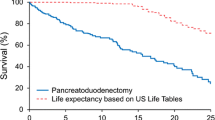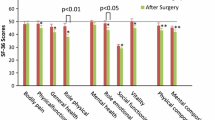Abstract
Introduction
In selected patients with chronic pancreatitis, total pancreatectomy with islet autotransplantation can be effective for the treatment of intractable pain while ameliorating postoperative diabetes. Improved quality of life scores and decreased daily narcotic use, as indicators of successful pain relief, are expected after total pancreatectomy. These outcomes and their relationship have not been well examined in this patient group.
Methods
A prospectively collected database of patients undergoing extensive pancreatectomy with islet autotransplantation for pancreatitis was reviewed. Data pertaining to daily oral morphine equivalents (MEs) and quality of life (QOL), as measured by the SF-12 questionnaire, in the preoperative and postoperative period were reviewed. Approval from the IRB for the evaluation of human subjects was obtained.
Results
Over a 20-month period, 33 patients (25 women, median age 42) underwent extensive pancreatectomy with islet autotransplantation for pancreatitis. Mean follow-up was 9 months with a range of 6–12 months. Postoperative complications occurred in 16 patients (48%). Preoperative QOL scores were a mean 25 for physical component and 32 for mental health component. Postoperatively, physical component scores averaged 33 at 6 months (p = 0.025) and 36 at 12 months (mean increase of 11); the mental health component scores averaged 43 at 6 months (p = 0.007) and 44 at 12 months (mean increase of 12). Preoperative MEs averaged 357 mg daily. At discharge from the hospital, this number increased to 536 mg average MEs daily, a 50% increase, as expected after major surgery in the chronic pain patient. At 6 months, 15 out of 31 patients (48%) required less daily MEs than preoperatively and averaged 161 mg daily (−55%). By 12 months, 11 out of 17 patients (65%) required less daily MEs than preoperatively and averaged 128 mg daily (−64%); four were narcotic-free (23%). Of the six patients who did not decrease their analgesic requirements at 1 year, five (83%) still had an improved physical QOL score (one patient was unchanged) and all six had an improved mental health QOL.
Conclusion
Total pancreatectomy with islet autotransplant is an effective surgery for end-stage chronic pancreatitis. Quality of life improves early postoperatively while decreased narcotic analgesia requirements occur later. Both improved quality of life and decreased narcotic analgesia requirements continue to occur at least up to 1 year postoperatively. Further investigation is needed to assess the durability of total pancreatectomy with islet autotransplantation for severe chronic pancreatitis with respect to pain relief and improved quality of life.


Similar content being viewed by others
References
Demir IE, Teiftrunk E, Maak M, Friess H, and Ceyhan GO. Pain mechanisms in chronic pancreatitis: of a master and his fire. Langenbecks Arch Surg 2011; 396:151–160.
Gruessner RWG, Sutherland DER, Dunn DL, Najarian JS. Transplant options for patients undergoing total pancreatectomy for chronic pancreatitis. JACS 2004; 198:559–67.
Argo JL, Contreras JL, Wesley MM, Christein JD. Pancreatic resection with islet cell autotransplant for the treatment of severe chronic pancreatitis. Am Surg 2008; 74:530–6.
Garcea G, Weaver J, Phillips J, Pollard CA, Ilouz SC, et al. Total pancreatectomy with and without islet cell transplantation for chronic pancreatitis. A series of 85 consecutive patients. Pancreas 2009; 38:1–7.
JieT, Hering B, Ansite J, Gilmore T. Pancreatectomy and Auto Islet transplantation in patients with chronic pancreatitis. JACS 2005; 201: S14.
Rilo HR, Ahmad SA, D’Alessio D. Total pancreatectomy and autologous islet cell transplant as a means to treat severe chronic pancreatitis. J Gastrointest Surg 2003; 7:978–89.
Morgan KA, Uflacker R, Nishimura M, Adams DB. Percutaneous transhepatic islet cell autotransplantation after pancreatectomy for chronic pancreatitis: a novel approach. HPB 2011.
McCullagh EP, Cook JR, Shirley EK. Diabetes following total pancreatectomy: clinical observations of ten cases. Diabetes 1958;7:298–307.
Lambert MA, Linehan IP, Russell RCG. Duodenum preserving total pancreatectomy for end stage chronic pancreatitis. Br J Surg 1987; 74:35–9.
Braasch JW, Vito L, Nugent FW. Total pancreatectomy for end-stage chronic pancreatitis. Ann Surg 1978; 188:317–22
Gall FP, Muhe E, Gebhardt C. Result of partial and total pancreaticoduoenectomy in 117 patients with chronic pancreatitis. World J Surg 1981; 5:269–75.
Dresler CM, Fortner JG, McDermott K, Bajorunas DR. Metabolic consequences of (regional) total pancreatectomy. Ann Surg 1991; 214:131–140.
Linehan IP, Lambert MA, Brown DC, Kurtz AB, Cotton PB, Russell RCG. Total pancreatectomy for chronic pancreatitis. Gut 1988;29: 358–65.
Cooper MG, Williamson RCN, Benjamin IS, Carter DC, Cuschieri A, Linehan IP, Russell RCG, Torrance HB. Total pancreatectomy for chronic pancreatitis. Br J Surg 1987; 74:912–5.
Stone WM, Sarr MG, Nagorney DM, Mcilarth DC. Chronic pancreatitis:result of whipple’s resection and total pancreatectomy. Arch Surg 1988; 123:815–9.
Flemming WR, Williamson RCN. The role of total pancreatectomy in the treatment of patients with end stage chronic pancreatitis. Br J Surg 1995; 82:1409–12.
Author information
Authors and Affiliations
Corresponding author
Additional information
Discussant
Dr. John D. Christein (Birmingham, AL, USA): I would like to thank the SSAT and the program chair for the invitation to discuss this nicely presented paper by Dr. Morgan out of MUSC. Their group has the highest volume program over the past year or so in this country when it comes to pancreatectomy and islet cell autotransplantation. I commend you once again on focusing your research regarding this field on quality of life and success of the operation from a pain and disability standpoint. Historically, the literature regarding operations to treat severe chronic pancreatitis revolved around pain relief and I feel that it’s important that we don’t get away from this just because we are doing an islet transplant. A few questions for you…
1. In your series, in contrast to that we have at UAB, a very small percentage of your patients who are alcoholic induce pancreatitis. Did you notice a difference in fibrosis or calcifications in these patients compared to the others and did you see a difference in outcome?
2. Could you compare the SF12 and SF 36 and have you seen a difference between the two?
3. What are your criteria for total pancreatectomy and islet transplant? Do you ever do partial resection or drainage procedures?
4. Most importantly, what system do you have in place for following these patients to manage their narcotic weening, steatorrhea, and diabetes long term?
Thank you again and I look forward to your discussion.
Closing Discussant
Dr. Katherine A. Morgan: Thank you, Dr Christein, for your thoughtful comments.
Our chronic pancreatitis patient group does vary significantly from the national norm in that the majority have sphincter of Oddi dysfunction as the primary underlying risk factor for disease. The pattern of pancreatitis associated with these patients is diffuse small duct fibrosis, in contrast to the calcific disease of alcohol-related pancreatitis. Clearly chronic pancreatitis is a heterogeneous disease and response to therapy should vary. Unfortunately, our numbers are too small at this point, with only four patients with alcohol-related pancreatitis, to understand the difference.
We originally used the SF36 quality of life survey. The SF12, however, is a shorter version of the SF36, and has been shown to reliably convey the same information, measuring the same domains. We therefore have converted to the SF12. The SF12 is a part of our online psychological assessment managed by the Department of Psychiatry and Behavioral Medicine at MUSC.
Good candidates for total (or completion) pancreatectomy are those with debilitating pain from chronic pancreatitis who have failed all lesser therapies. In general, if targeted resection or drainage procedures are potentially beneficial, these are performed in preference to the more radical procedure. Patients with diffuse small duct disease, those who have failed lesser operations, and those with hereditary pancreatitis may benefit from total pancreatectomy.
Managing the long-term needs of this patient group is challenging. We have established a nice multidisciplinary group of interested providers at our institution that participate in the care of these patients, including a pain nurse practitioner, medical pancreatologists, endocrinologists, and dietitians. Early postoperative care and initial pain management is managed by this group. As these patients are often referred from some distance, however, we make every attempt to find health care support in their local community for long-term needs.
Rights and permissions
About this article
Cite this article
Morgan, K., Owczarski, S.M., Borckardt, J. et al. Pain Control and Quality of Life After Pancreatectomy with Islet Autotransplantation for Chronic Pancreatitis. J Gastrointest Surg 16, 129–134 (2012). https://doi.org/10.1007/s11605-011-1744-y
Received:
Accepted:
Published:
Issue Date:
DOI: https://doi.org/10.1007/s11605-011-1744-y




